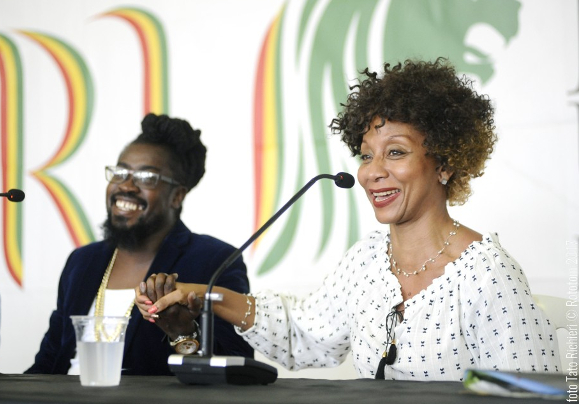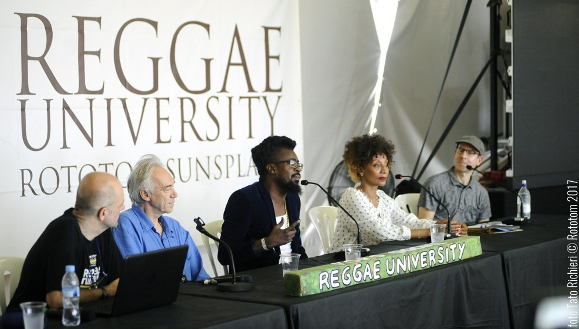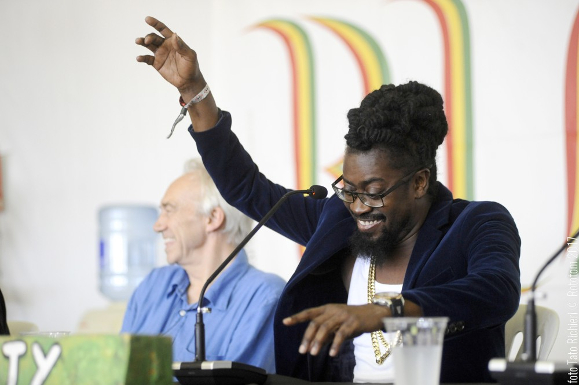Articles about reggae music, reviews, interviews, reports and more...
Beenie Man and Nadine Sutherland tell the Reggae University their dancehall stories

Beenie Man and Nadine Sutherland tell the Reggae University their dancehall stories
The two child stars turned dancehall hitmakers reminisced with author and journalist John Masouri about their exciting and varied careers.
It was dancehall’s turn to take the spotlight for day five of the Rototom Reggae University. Special guests were two artists who became stars as children, consolidated success in 90s dancehall, then further affirmed African consciousness in maturity: deejay Beenie Man and singer Nadine Sutherland. Joining regular panellists David Katz and Pier Tosi was fellow author and journalist John Masouri from the UK.
Before the talk, the university screened Stéphane Delphin’s documentary, ‘Soul Rebels – The Untold Story of Dancehall Music’. This French made 52-minute film, shot in Jamaica, examined the influence of folk rhythms like Revival, Kumina and Pocomania on dancehall music.
Apart from an interview with Sizzla, the filmmakers eschewed the big deejays, giving welcome attention to the traditions’ practitioners and the makers of hit rhythms such as Steely and Sly Dunbar. Despite a sprawling narrative and the interviewers’ occasional struggles with the more nebulous concepts, they gleaned ample useful information within restrictions on budget and time.

Beenie Man and Nadine Sutherland were delayed by 20 minutes for their panel appearance. On arrival, they recieved a dancehall style “forward” from the audience and shouts of “pull up!”
The talkative guests quickly delved into two fascinating stories of lifetimes in music. Both Nadine and Beenie entered the Tastee Talent competition as children. A lover of singing and dancing from birth, Nadine won and was signed by Bob Marley’s Tuff Gong Records. Beenie narrowly lost to a young Yellowman the first time he tried, but returned and became a child deejay sensation. John Masouri reminded Beenie that his mother had remove him from the dance when he sneaked out aged five to take the mic.
Leaving Tuff Gong, Nadine began voicing more up-tempo records for Gussie Clarke, Donovan Germain and Fatis Burrell. She saw no divide between the roots reggae she first sang and dancehall. “People think there is this big distinction” she explained “Reggae was dancehall back in the days. It’s all culture”. Masouri recalled Fatis Burrell saying her recording, Pair of Wings, reduced everyone in the studio, including Nadine, to tears.

At the same time Beenie Man got a break deejaying on Against War with Dennis Brown and his friend Tristan Palmer. “I wasn’t a big superstar,” he said with humility “I happened to be in the studio when these greats walked in. I give thanks. Rastafari”. As the 90s progressed, Beenie ascended to superstardom, voicing for the likes of Bobby Digital and Shocking Vibes. A bubbly personality, Nadine overflowed with praise when her contemporary’s music played to the audience. “It’s your natural talent,” she told him “I’m a Beenie Man fan”.
Due to the late start the session’s last segment had to be truncated. But not before the University heard samples of Nadine’s recent roots anthem for Mad Professor, Inna Mi Blood, and Beenie’s 2016 duet with Etana, Money is the Motive, for Germany’s Jugglerz. Nadine said the emotion of Inna Mi Blood was inspired by the Black Lives Matter protests and struggling to finish her Masters thesis at University of the West Indies. Beenie had the final word, collapsing the tent with laughter when he joked “Don’t forget, I’m performing tonight”, referencing his well-publicised appearance on the Main Stage.

Read more about this topic
Comments actually desactivated due to too much spams
Browse by categories
Recommended Articles
Latest articles
Recently addedView all
© 2007-2026 United Reggae. All Rights Reserved. Reproduction in whole or in part is prohibited. Read about copyright
Terms of use | About us | Contact us | Authors | Newsletter | A-Z














